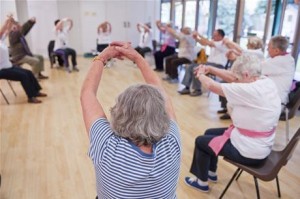Pulmonary Rehabilitation is the key for anyone who has a chronic lung disease. This can include COPD (chronic obstructive respiratory disease) emphysema or chronic bronchitis.
Those with Cystic fibrosis also undergo pulmonary rehabilitation.
The goal of undergoing pulmonary rehabilitation is to give the individual a chance to live a full life by restoring the highest pulmonary function possible.
Those individuals who undergo lung surgery are often referred to this therapy before and after surgery.
What to Expect From Pulmonary Rehabilitation
Often a team of healthcare providers work with the individual, from their doctor, nurses, rehabilitation therapists, dietitians and psychosocial staff.
The team must evaluate and become familiar with each individual's physical and emotional status. A program is developed specifically for them.
Areas covered and goals to be reached include:
- Lessening the respiratory symptoms and the complications
- Helping them learn to manage their daily medical and physical needs
- Improving their physical conditioning through an exercise routine
- Learning more about nutritional needs
- Becoming strong, mentally, in regard to persisting in their self improvement
- Decreasing hospitalizations
Pulmonary Rehabilitation (PR) is not a quick fix, but rather a long term commitment by the individual.
Most of the therapy will be done through an outpatient clinic. Some may also be done in the individual’s home.
The various components included in pulmonary rehab programs will include:
- Management of medications
- Education about their specific condition
- Exercising to benefit the lungs and overall physical conditioning
- Breathing exercises
- Emotional support as needed
- Nutritional guidelines
Learning about the disease and the means needed to manage it is critical. The PR team will go over the various medications required and the best way to manage them.
What to do during a flare up will be covered they can prevent problems from starting. If oxygen therapy is needed, the proper way to handle a portable oxygen concentrator, oxygen tank, or liquid oxygen under various circumstances will be gone over.
The importance of vaccinations, how to prevent infections are covered. If the individual is a smoker, they will be offered a program to help them quit.
The need for good air quality in the home will be covered. Second hand smoke is just as bad.
The exercise plan will include activities for both strength and stamina.
Just how strenuous the activities are depends on the physical condition of the individual. They may begin with exercises done in a therapy pool.
The oxygen level will be checked during the exercising via a device attached to one's finger.
An exercise program must be done at least three times a week to be beneficial.
Being overweight makes breathing difficult because the extra weight about the waist, pushes up against the diaphragm. This prevents the lung from being able to fully expand during breathing.
There are some breathing techniques that are beneficial for improving breathing. Taking longer and deeper breaths instead of short shallow ones is better and can be learned through practice.
A specific technique, called pursed-lip breathing is often taught. Basically, you breath in through your nose and exhale slowly through the lips which are pursed, as if blowing out a candle. The exhalation should be two to three times longer than the inhalation.
Since many experiencing breathing difficulties are frustrated and concerned about their health, they may develop depression.
This is why a psychological support program is included. Positive thinking, joining a support group for dealing with the problems they are going through gives long term help.
Finally, learning how to manage food preparation and intake is covered. This knowledge is a lifetime change with any chronic condition when proper weight is important.
+Caleb Umstead





